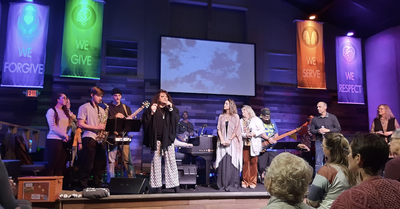While war in the Middle East dominated international headlines, Islamic extremists in the shadows were taking jihad to Christian civilians in Africa with unprecedented intensity in 2016. In Nigeria, Muslim ethnic Fulanis looked less like nomadic herdsmen and more like well-armed, well-funded jihadist militants. Close Muslim relatives and Islamist village mobs attacked their Christian kin in Uganda, while Somalia’s Al Shabaab rebels intensified their campaign to drive Christians from northern Kenya. At the same time, courts in Turkey and Pakistan made history by finally providing some measure of justice in cases of slain Christian martyrs.
1 – Islamist Militant Massacres in Nigeria
Muslim Fulani herdsmen attacks on Christians in Nigeria increased in number and sophistication in 2016, as what the mainstream press has characterized only as land disputes increasingly took on the militant look of jihadist campaigns that have always featured prominently in the attacks. Organized, well-funded invasions of Christian villages, sophisticated arms and explosives, and suspected links with Islamic extremist group Boko Haram and Islamist mercenaries marked many assaults. Having retaken much of the territory that Boko Haram claimed in Nigeria’s northeast in 2014-2015, the Nigerian military has reportedly warned Fulani herdsmen that they will be targeted next, according to a Nigerian Defense spokesman. Nigerian senators believe defeated Boko Haram militants have joined Fulani herdsmen, who had already been characterized by the Institute for Economics and Peace as one of the five deadliest terrorist organizations in the world.
The massacre of an estimated 300 predominantly Christian farmers in Benue state’s Agatu area in central Nigeria from Feb. 22 to Feb. 29 preceded Muslim Fulani attacks the rest of the year in southern, middle and northern states. The militant character of the attacks was especially apparent in Kaduna state, where on Nov. 16 the Rev. Zachariah Gado, state chairman of the Evangelical Church Winning All, decried “a campaign of ethno-religious cleansing by Fulani herdsmen militia.”
2 – Untold Faith, Bravery Revealed in Hidden Pockets of Uganda
In quiet villages in eastern Uganda far from the international spotlight, Christians continued to be beaten, thrown out of their homes, raped, arrested and killed for leaving Islam in 2016 with alarming regularity. Some had their homes or crops burned. In many of the cases, the victims received messages warning that leaving Islam would cost them their lives.
The constant stream of abuses otherwise stirred little attention as the primary culprits were non-state actors such as Muslim family members and village mobs that advocacy groups and government officials felt little power to influence. Aid agencies can be contacted about how these Christians or their families might be helped.
3 – Easter Bombing in Pakistan
A deadly suicide bombing at a public park in Lahore, Pakistan killed 75 people on Easter Sunday on March 27. The Islamic extremist group that took responsibility for the blast said it targeted Christians, but later reports showed only 14 of the dead were Christian and 61 Muslim. Most of those killed were women and children.
Another 362 people were injured in the deadliest attack in Pakistan since the December 2014 massacre of 134 schoolchildren at a military-run academy in Peshawar. Jamaat-ul-Ahrar, a splinter faction of the banned Pakistani terrorist group Tehreek-e-Taliban Pakistan (TTP), took responsibility for the bombing. In a media statement, Jamaat-ul-Ahrar spokesman Ehsanullah Ehsan said a suicide bomber deliberately targeted the Christian community.
Photo: Body of small Christian boy at Mayo Hospital morgue after Islamist suicide bombing in Lahore, Pakistan. (Morning Star News)
4 – Killers in Malatya, Turkey Murders Finally Convicted
After a nine-year legal saga, a Turkish criminal court on Sept. 28 sentenced five men to life in prison for the torture and murder of three Christians in southeast Turkey in 2007. The court found Salih Gurler, Cuma Ozdemir, Abuzer Yildirim, Hamit Ceker and Emre Gunaydin guilty on three counts each of premeditated murder and sentenced them all to life in prison without the possibility of parole.
The number of hearings and the fact that the case took so long to prosecute was the source of a great deal of anguish for Turkey’s Christians. Judges and prosecutors were changed more than once, causing significant delays, and subpoenaed witnesses simply refused to show up in court to testify without legitimate reason and without being punished later for contempt of court. Most significant in delays was the attempt to explore links between the killings and a larger alleged attempt by the Turkish military to subvert the Justice and Development Party-led government.
On April 18, 2007, in the office of the Zirve Publishing House in Malatya, the five Muslim, Turkish nationalists killed Ugur Yüksel, 32, and Necati Aydin, 36, both Turkish converts from Islam, and Tilmann Geske, 45, a German national. They bound the three men, interrogated them about their Christian activities, mutilated them and then slit their throats, according to court evidence and testimony.
5 – Defying Fierce Islamist Pressure, Courts in Pakistan Deliver Justice
Courts in Pakistan defied history in 2016, daring to deliver justice for minority Christians in the face of fierce Islamist pressure. Six Muslims were sentenced to death for three murders in 2016, with one convicted killer executed. Mumtaz Qadri was hung to death on Feb. 29. While Qadri’s victim, former Punjab Gov. Salman Taseer, was not a Christian, the official was killed for his defense of Aasiya Noreen (commonly known as Asia Bibi) and his attempt to reform the blasphemy laws that unfairly convicted the Christian mother of five and put her on death row.
On Nov. 25, a court in Lahore handed the death sentence to five Muslims for torturing and killing an impoverished Christian couple over allegations of burning the Koran. Eight others charged in the attack were sentenced to two years in prison. Hundreds of villagers in Kot Radha Kishan, incited by Muslim leaders calling for violence via mosque loudspeakers, were involved in the Nov. 4, 2014 assault in which 26-year-old Shahzad Masih and his five-months pregnant wife, Shama, 24, were thrown into a burning brick kiln.
Anti-Terrorism Court Judge Chaudhry Azam handed death sentences to Irfan Shakoor, Muhammad Hanif, Mehdi Khan, Riaz Kamboh and Hafiz Ishtiaq, along with a fine of 200,000 rupees (US$1,900) to each for inciting violence against the Christian couple and throwing them into the kiln. The judge ordered the two-year prison terms for Noorul Hasan, Muhammad Arsalan, Muhammad Haris, Hussain, Muhammad Munir, Muhammad Ramzan, Irfan and Hafiz Shahid.
Masih and his wife worked as bonded laborers at the brick kiln when the throng descended on them after area Muslims accused them of committing blasphemy by burning Koranic pages.
The mob tore the clothes off them, struck them, broke their legs, dragged them behind a tractor and threw them into the burning furnace of a brick kiln – even though Shama was illiterate and could not have known even if koranic verses were among debris that she had burned. Under Pakistan’s widely condemned blasphemy statutes, intent must be shown for a conviction of desecrating the Koran.
6 – Al Shabaab Terrorizes Christians in Northern Kenya
Islamic extremists from the Somali rebel Al Shabaab turned the Mandera area of northern Kenya into a cauldron of fear with bomb, gun and grenade attacks in a campaign to rid the area of Christians. On Oct. 25, Al Shabaab militants took responsibility for a pre-dawn attack in which the rebels shot 12 non-local Kenyans whom they presumed were Christians. On Oct. 6, suspected Al Shabaab militants targeted Christians in a grenade-and-gun attack in the early morning that killed six people.
The attacks targeted predominantly Christian migrant workers from Kenya’s interior. A spokesman for Al Shabaab said the Oct. 6 attack was designed to drive Christians from the area. At least one of the victims was reportedly a Muslim. The attack in Mandera, tucked in Kenya’s northeast corner near the Somali border, reportedly wounded several others. Among 27 people rescued were Christians who arrived at their church traumatized and in shock. “The loud grenade woke me up, and I heard one of the attackers saying the ‘infidels’ should leave the Muslim area of Mandera,” one survivor told Morning Star News. “There were loud cries for help as the attackers were shooting from all directions.”
In another pre-dawn raid on a predominantly Christian area in coastal Kenya, Al Shabaab rebels on Jan. 31 killed at least four Christians, beheading one of them.
7 – Boys Sentenced to Prison in Egypt Escape to Switzerland
Four Egyptian boys who appeared in a video that led to prison sentences for allegedly blaspheming Islam and that sparked a riot in Upper Egypt fled to Switzerland on Sept. 1. A judge on Feb. 25 had sentenced Albir Shehata, 17, Klenton Faragalla, 18, Moller Yasa, 17, and Bassem Younan, 17, all of Al-Nasriyah village in Upper Egypt, to five years in prison for defaming a revealed (or heavenly) religion in a mobile phone video. While taking refuge in Turkey, the boys said they made their video before the release of the Islamic State (IS) mass execution video they were said to be mocking, and that at the time they had never even heard of the group.
They said their defense attorney, in an effort to garner sympathy for them, had claimed they were making fun of IS terrorists in the video, following the release of IS’s video showing the beheading of 20 Coptic Christians in Libya. Because of their attorney’s statements, however, the fiction about IS being the subject of the boys’ scorn was widely reported in Egyptian and international media.
After a Muslim found the video on April 6, 2015, a group of Muslims complained to the police, and on April 8 a mob of enraged Muslims began tearing through Al-Nasriyah village, beating any Copt they could find. For three days the rioting raged as thousands of Muslims from adjacent villages came to Al-Nasriyah to join the looting. At least 15 stores were damaged or destroyed. Mobs roamed through Al-Nasriyah chanting Islamic slogans and demanded all Christians be pushed out of the village. During the rioting, the four boys were terrified for their lives.
8 – China Ramps Up Pressure on Churches, Rights Activists
After two years of removing 1,800 crosses, demolishing church buildings and arresting, beating and killing protesting Christians in Zhejiang Province, the Chinese government on Sept. 8 released a draft of new Regulations on Religious Affairs that gives it broader powers to crack down on Christianity.
Under the regulations, unregistered and unapproved “house churches” would no longer be tolerated, and registered churches would come under even stricter guidelines. All building would be tightly regulated. The clampdown comes on the heels of a July 1, 2015 National Security Law that paved the way for increased nationwide repression and persecution in the name of “national security.” Soon after it was passed, Chinese authorities arrested some 300 prominent human rights activists and lawyers, including several who were defending religious cases, in particular cases from Zhejiang. The law defines criticism of the government as a form of subversion.
9 – Indonesia Faces Test of Democratic Values, Rights
The world’s largest Muslim-majority democracy began a precedent-setting test pitting freedom of speech and religion against religious fanaticism when Jakarta Gov. Gov. Basuki “Ahok” Tjahaja Purnama went on trial on Dec. 13 for defaming the Koran. Hundreds of people outside the courtroom chanted for the incumbent gubernatorial candidate to go to jail for a comment he made earlier in the year.
Ahok told city officials in a Sept. 27 speech, “Ladies and gentlemen, you don’t have to vote for me because you’ve been lied to [or fooled] with Surat Almaidah 51 [Sura 5:51] and the like. That’s your right. If you feel you can’t vote for me because you fear you’ll go to hell, because you’ve been lied to [or fooled], no worries. That’s your personal right. These programs will go forward. So you don’t have to feel uncomfortable. Follow your conscience, you don’t have to vote for Ahok.”
Video footage of the speech went viral on YouTube, and Islamic extremists claimed Ahok had blasphemed against the Koran and Islamic clerics. Ahok on Oct. 10 apologized “to all Muslims and anyone who felt offended,” saying it was not his intention to slight Islam or the Koran. If found guilty, he faces up to five years in prison.
10 – U.S.-Iranian Pastor Released from Prison in Iran
Iran released U.S.-Iranian pastor Saeed Abedini from prison on Jan. 16, more than three years after authorities arrested him on charges of “threatening national security” by planting churches. Abedini was released along with four other prisoners, including Washington Post journalist Jason Rezaian, in a prisoner swap, Iran’s official Islamic Republic News Agency (IRNA) reported. U.S. officials reportedly confirmed that the release was part of a prisoner swap involving seven Iranians held on charges of violating sanctions and came after more than a year of closely guarded talks.
On Jan. 27, 2013, an Iranian court sentenced Abedini to eight years in prison for allegedly threatening “national security” by planting house churches in early 2000. Seven months earlier, in July 2012, the Iranian Revolutionary Guard had briefly arrested Abedini during his visit to set up an orphanage he was building. After interrogation, authorities placed him under house arrest and told him to wait for a court summons to face criminal charges for his Christian faith. Two months later, on Sept. 26, 2012, he was arrested at his parents’ home and taken to prison.
Abedini was tortured at various times throughout his imprisonment, and in 2015 prison officials further pressured him to recant his faith by threatening to hold him in prison indefinitely. In 2013, Abedini wrote of enduring torture, death threats and pressure to renounce his faith.
If you would like to help persecuted Christians, visit http://morningstarnews.o
If you or your organization would like to help enable Morning Star News to continue raising awareness of persecuted Christians worldwide with original-content reporting, please consider collaborating at http://morningstarnews.org/don
Photo: Remains of St. Paul’s Catholic Church in Mile One village, Kaduna state.
Photo courtesy: Morning Star News
Publication date: January 6, 2017










